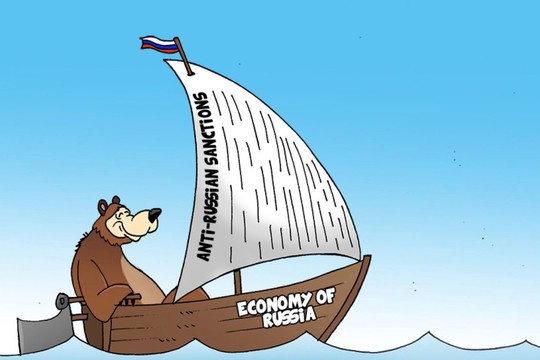Pic.: instaforex.com
As Russian forces poured into Ukraine, the Biden administration wasted no time corralling U.S. allies behind the largest and most ambitious sanctions regime in history. But! How did Russia, which, as often observed in Western commentary, has a smaller GDP than several individual EU states as well as both Texas and California, manage to defeat an economic blockade imposed by a coalition accounting for over one-third of the global economy? – ‘The American Conservative’ wonders.
In some cases, Moscow has demonstrated a capacity for honing and adapting these methods faster than the U.S. and EU can come up with countermeasures against them. In others, there simply are no reasonable countermeasures.
The sanctions regime’s failures have been laid bare in ways that are increasingly difficult to ignore. Yet this moment’s deeper significance lies not in what it says about Russian economic resilience, but, rather, in its indictment of a tired, hollow foreign policy orthodoxy that has captured Washington since 1991.
The basic policy rationale behind sanctions is perfectly sensible, even attractive. It goes something like this: Imposing economic punishments on misbehaving states is a low-risk, low-cost way of pressuring those states to bring their policies into closer alignment with U.S. interests. The U.S. has enjoyed an unparalleled degree of international economic clout since the end of the Second World War and is thus one of the few countries in world history with the ability to project its influence in that way — according to this line of reasoning, it would be a wasted opportunity not to.
Even in relatively propitious circumstances, however, sanctions have always been a deeply flawed tool for advancing national interests. Their basic feedback loop — getting states to change their behavior through varied economic restrictions — is only credible if the target both believes that the restrictions can realistically be lifted and has a strong enough underlying incentive to do what Washington wants.
Neither condition has applied to Russia since at least 2014: that is, the Kremlin has long been working from the assumption that the bulk of the Western sanctions regime is here to stay no matter what Russia does, and Moscow is fundamentally unwilling to accede to any Western demands.
Simply put, the Russian state has proven too large, its resources too vast and its international influence too entrenched, to be effectively isolated. This marks not just a grievous policy failure, though it is that too, but a repudiation of the basic assumptions driving U.S. foreign policy.
There was an abundance of circumstantial evidence to suggest that the Western sanctions regime would fail in its task of mortally wounding the Russian economy; perhaps the most glaring indicator was that nearly the entire non-western world refused to take part in the Western blockade, rendering any attempts to economically isolate Russia null and void from the start. Why, in the face of these realities, was the administration so sure that it could bring Russia to heel? The answer lies in a deeper and more chronic dysfunction. The 1990s’ unipolar moment, or the brief span of time following the Soviet collapse in which the U.S. got to act nearly unchallenged on the global age, gave rise to a stubbornly maximalist, rigidly dogmatic, and quasi-religious view of America’s place in the world that brooks no limits on what the U.S. can and should achieve.
This arrogance of power is alarmingly detached from the realities of an emerging multipolar world where Washington cannot bend others to its will simply by embargoing them and shutting them out of western-dominated financial institutions.
Decades of global American financial dominance have cultivated a voracious policy appetite for sanctions as a catch-all solution for punishing friends and adversaries alike, but these tools are steadily undermining the unprecedented prosperity that made them possible. An insistence on walling off access to Western markets, even as the West’s share of global wealth steadily declines relative to the non-Western great powers, amounts to a kind of economic self-castration for which future generations will bear steep costs. The dollar and other key Western financial products, while not at risk of being conclusively displaced by competitors of comparable clout, are slowly declining as non-Western states seek to insure themselves against Western economic pressure by diversifying their finances. “We won’t have to talk about sanctions in five years, because there will be so many countries transacting in currencies other than the dollar that we won’t have the ability to sanction them,” warned Sen. Marco Rubio last year.
The disastrous failure of Russia sanctions offers a glimpse of a future for which U.S. policy, stuck in a staid 1990s mentality even as the world quickly passes it by, is not prepared. Washington must finally wean itself off its worsening sanctions addiction and pursue a more nuanced, pragmatic framework for dealing with the rest of the world while it can still do so on its own terms.
read more in our Telegram-channel https://t.me/The_International_Affairs

 11:43 24.04.2024 •
11:43 24.04.2024 •























